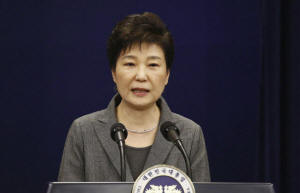|
South Korea's Park asks parliament to
decide how she can quit, opposition cries foul
 Send a link to a friend
Send a link to a friend
 [November 29, 2016]
By Ju-min Park and Jack Kim [November 29, 2016]
By Ju-min Park and Jack Kim
SEOUL (Reuters) - South Korean President
Park Geun-hye on Tuesday asked parliament to decide how and when she can
give up power over an influence-peddling scandal, taking the country's
political crisis deeper into uncharted terrain.
The main opposition Democratic Party rejected Park's offer, calling it a
ploy to escape being impeached, and said it would continue efforts to
bring an impeachment motion in parliament, which they have sought to do
as soon as Friday.
No South Korean president has failed to complete a single five-year term
since the current democratic system was implemented in 1987.
"I will leave to parliament everything about my future including
shortening of my term," Park said in a brief televised speech.
Her dramatic maneuver puts the burden of resolving the political crisis
on parliament, which has been controlled by a coalition of opposition
parties since Park's conservative Saenuri Party unexpectedly lost its
majority in April elections.
If Park resigns or an impeachment vote in parliament is upheld by the
Constitutional Court, an election must be held in 60 days to nominate a
president to serve a five-year term, with the prime minister leading the
country in the interim.

That short time frame could leave the main political parties looking to
buy time in order to coalesce behind presidential candidates, and
political analysts said it may take months for parliament to agree on an
exit plan for Park.
"I will step down from my position according to the law once a way is
formed to pass on the administration in a stable manner that will also
minimize political unrest and vacuum after ruling and opposition
parties' discussion," Park said, her voice firm.
Park Kwang-on, a Democratic Party lawmaker, said it looked like she was
trying to stall proceedings.
"She is handing the ball to parliament when she could simply step down,"
he told Reuters.
"She is asking parliament to pick a date for her to resign, which she
knows would lead to a discussion on when to hold the presidential
election and delay everything."
Park, 64, had apologized twice previously but until Tuesday resisted
mounting public calls to quit. Her term is scheduled to end in February
2018.
"She doesn’t want the parliament to impeach her and she doesn't think
that the parliament can soon reach an agreement, so she is making things
complicated and trying to shift some of her blame to the parliament,"
said Shin Yul, a professor of political science at Myongji University.
[to top of second column] |

South Korean President Park Geun-Hye speaks during an address to the
nation, at the presidential Blue House in Seoul, South Korea, 29
November 2016. REUTERS/Jeon Heon-Kyun/Pool

ROCK-BOTTOM APPROVAL RATING
Some lawmakers from Park's Saenuri party had asked her to resign
under an agreement that would allow her to leave office with some
dignity.
On Saturday, hundreds of thousands of South Koreans rallied for the
fifth weekend in a row, calling for Park's resignation. Organizers
said the crowd totaled 1.5 million, while the police estimated the
crowd at 260,000.
Park's approval rating fell to just 4 percent in a weekly survey
released on Friday by Gallup Korea, an all time-low for a
democratically elected South Korean president.
Park's friend, Choi Soon-sil, and a former aide have been indicted
in the case. Prosecutors named Park as an accomplice in an
investigation into whether big business was inappropriately
pressured to contribute money to foundations set up to back Park's
initiatives.
The presidential office and Park's lawyer have denied the
accusations. She has immunity from prosecution in the case as long
as she remains in office.
Park has acknowledged carelessness in her ties with Choi, who Park
has said had helped her through difficult times.
"Not even for a moment did I pursue my own gains and I have lived
without one iota of self-interest," Park said on Tuesday.
The friendship dates to an era when Park served as acting first lady
after her mother was killed by an assassin's bullet intended for her
father, then-president Park Chung-hee. Five years later, in 1979,
Park's father was murdered by his disgruntled spy chief.
(Additional reporting by Cynthia Kim, Christine Kim and Yun Hwan
Chae; Editing by Tony Munroe and Nick Macfie)
[© 2016 Thomson Reuters. All rights
reserved.]
Copyright 2016 Reuters. All rights reserved. This material may not be published,
broadcast, rewritten or redistributed.
 |